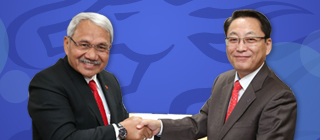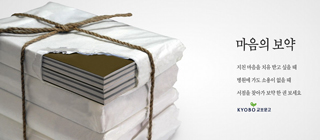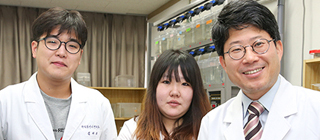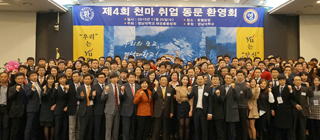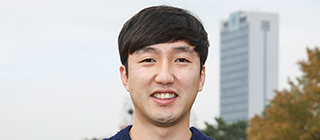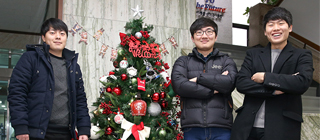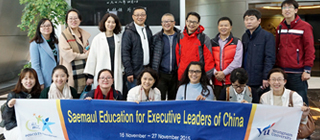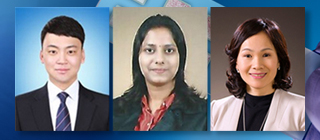-
YU-Indonesia Public Official Academy signs MOU IPDN President Suradinata visits YU Promise to participate in global Saemaul network [December 27, 2015] <IPDN President Suradinata of Indonesia (left) visited YU and requested support for the establishment of the Saemaul Research Center.> YU (President Noh Seok-kyun) received a request to provide support for the establishment of the Saemaul Research Center from Indonesia. On the 23rd, YU President Noh Seok-kyun signed an exchange and cooperation MOU with Mr. Ermaya Suradinata, the president of IPDN (Institute Governance of Home Affairs), which is the public employee academy of Indonesia. According to this MOU, the two universities will pursue exchange of professors and students in the Saemaul development field and operate credit-exchange programs. In particular, YU pledged support in researchers and education and training contents for the establishment of the Saemaul Research Center within IPDN. IPDN of Indonesia was established in 1956 with the goal of fostering public employees and there are currently eight campuses in operation throughout Indonesia. All students receive national scholarships and upon graduation, they are all hired as public employees. Mr. Suradinata was formerly a four-star general and served as the Minister of Defense, and is currently active as an advisor to President Joko Widodo. <Mr. Suradinata met with Global Saemaul Development Network (GSDN) President Choi Wae-chul (left) and promised participation in the GSDN.> IPDN President Suradinata, vice-president, and the dean of academic affairs visited YU from the 22nd to 24th and held a meeting with Choi Wae-chul (YU Vice-president), the president of the Global Saemaul Development Network (GSDN), which is an NGO participated by 58 emerging countries. Mr. Suradinata promised to participate in the GSDN during this meeting. International Students at the Saemaul Graduate School from 44 Nations Held New Years Event Various programs held such as traditional clothing fashion show from different countries, talent shows, and presentations on the Saemaul spirit Showed off Korean skills they learned while singing K-pop Meanwhile, international students enrolled at the Park Chung Hee School of Policy and Saemaul (Director Park Seung-woo) held the 'Global Saemaul New Year's Night' event to finish off the year. This event, which was held at the YU Cheonma Art Center Convention Hall was joined by 190 international students from 44 countries, as well as YU vice-president Choi Wae-chul and professors and employees in the Park Chung Hee School of Policy and Saemaul. The student president Kakono David Mabula (Tanzania) who organized the event said, "We wanted to make our friendship as members of the Saemaul community over the past year stronger," and added, "We prepared many programs to increase interest on Korean culture and to improve understanding on the Saemaul Undong." In the first part of the event, five teams participated in the 'Korean Song Contest' where they sang K-pop ranging from trot to pop, drama sound tracks and movie sound tracks such as 'Eomeona', 'I Love You', 'Maria', and 'All For You' as they boasted their Korean skills. In the second part of the event, 13 participated in the 'Miss and Mister Saemaul Contest' to hold fashion shows with traditional clothes, compete in talent shows, and express their thoughts about the Saemaul spirit. This program awarded male and female contestants based on how well they expressed their pride for their country's culture and how well they expressed their thoughts on the Saemaul spirit. In particular, Khan Areef Anowar (Bangladesh, Environmental Management and Policy) drew a portrait of Former President Park Chung-hee during the talent show and amazed everyone at the event. YU Vice President Choi Wae-chul (Director of the International Development Cooperation Center) who attended this event brought various gifts such as gloves and headphones for all of the students to show his support for international students who brought in the new year in a foreign land away from their homes and families. In his address, Mr. Choi said, "Let's reflect upon the past year and bring in the New Year with a new resolution and filled with emotions," while adding, "I hope that we also take the time to think about our poor and alienated neighbors." The Park Chung Hee School of Policy and Saemaul was opened in November 2011 for the globalization of the Saemaul Undong. Since its opening, 340 students from a total of 56 countries enrolled and there are currently 196 international students from 44 countries studying here as of December 2015. Three quarters of the students at the YU Park Chung Hee School work in the development fields of emerging nations and thus, this school has established itself as the top educational institute in the global Saemaul development field.
-
Ministry of Education selects 5 new project teams Largest among private universities outside of Seoul area Graduate school competitiveness recognized in all academic fields including engineering, natural science, pharmaceuticals, and social sciences [December 24, 2015] YU (President Noh Seok-kyun) was pre-selected for a total of 12 projects in the interim evaluations of the Ministry of Education's 'Brain Korea (BK21) Plus Project' and will thus operate the most number of project teams among private universities outside of the Seoul area. Overall, it is 15th place in the nation. The 'BK21 Plus Project' fosters outstanding graduate schools by academic fields and provides research scholarships to graduate school students. It began in 2013 and invests 269.7 billion won annually, and supports approximately 15,500 master's and PhD level students made up of 13,000 in the science technology sector and 2,500 in the humanities and social science fields. According to the preliminary results of the interim evaluations announced by the Ministry of Education and National Research Foundation on the 23rd, YU's seven existing project teams were all selected again, while five project teams were additionally selected. The newly selected teams are the Climate Change Adaptation Sustainability Water Industry Human Resource Fostering Project Team, E-CAR (Electrified-CAR) Core Electric Energy Technology Human Resource Fostering Project Team, Biomimetics Fine Reaction System Research Team for Carbon Dioxide Light Conversion Fuel, Super Generic Development Customized Creative Human Resources Fostering Project Team, and the Regional Small-Strong Company Creative Human Resource Fostering team. This shows that the competitiveness of the graduate school was recognized in all academic fields such as engineering, natural science, medical-pharmaceutical, and social science. YU President Noh Seok-kyun said, "I am very happy that the basis for the next academic generation that will lead the creative economy was expanded so that they may concentrate on studies and research," while adding, "The school will spare no efforts so that more world-class research results can be made. The selected project teams will receive funding for projects for four years until 2020. The Ministry of Education and National Research Foundation will inspect materials submitted by schools such as on research expenses and snowballing thesis performances by January 2016 and confirm selection in February. Meanwhile, the interim evaluation by the Ministry of Education was made at high intensity levels and reevaluated all applications. In order to evaluate the 544 project teams selected in 2013, 227 teams in the top 50% were re-selected first. 343 teams in the lower 50% and 479 new applications were evaluated from which 269 were selected. 24 teams that had considerably poor performance were disqualified without being given the opportunity for reevaluation. Accordingly, 125 or 22.9% of the 544 existing project teams were disqualified. 127 project teams were newly selected and among the pre-selected project teams, 23.3% were changed.
-
Active as professor in College of Music (Korean Music) and Gayageum player Contributions in popularizing gayageum through concerts and creative activities KBS1TV concert and award broadcast at 2 p.m. on the 31st [December 30, 2015] YU College of Music (Korean Music) Adjunct Professor Kwak Su-eun (46) won the grand prize at the '2015 KBS Traditional Music Awards'. Professor Kwak, who is a gayageum player, received the grand prize in performing string instruments after being recognized for her contributions in publicizing the gayageum through performances and creative works at the Traditional Music Awards held at the Yeouido KBS Hall in Seoul on the 26th. The KBS Traditional Music Awards is in its 34th year this year and selects and awards traditional musicians who contributed in the development of traditional music through performance and broadcasting activities throughout the year. This year's KBS Traditional Music Awards selected winners in nine areas (folk songs, pansori, performing chamber music, performing string music, orchestra, composition, dance, publishing and media, special contribution awards) through the recommendations of a sub-committee comprised of musicians in the respective fields and traditional music producers, concert planners, music critics, and professors from October, who were then judged by the main judging committee. in addition to Professor Kwak who received the grand prize, other winners were Choi Yoon-young (folk song), Ahn I-ho (pansori), Kim Hyo-young (performing chamber music), Baraji (orchestra), Ahn Hyun-jung (composition), Yoon Mi-ra (dance), Just Music (publishing and media), and Lee Sang-ryong (special contribution award). Performances and awards that reinterpreted traditions by this year's winners will be aired on KBS 1TV at 2 p.m. on the 31st.
-
Grand prize in awards sector with 'Elixir of the Heart' Public benefit and commercial such as leading to purchase of books and promoting reading All 4 pieces submitted awarded [November 20, 2015] Kim Do-hoon (23, photo on left), a junior in the Department of Visual Communication Design won the grand prize at the '2015 Maeil Newspaper Advertisement Awards'. The Maeil Newspaper Advertisement Awards, which is in its 13th year this year, is an advertising contest that has been held since 2003 for the development of the advertisement industry by the Maeil Newspaper Company. This contest that was categorized in the creative and general sector gave the grand prize in the creative sector to Mr. Kim Do-hoon, who teamed up with Kwon Do-won of Yeungnam University College, for the piece titled 'Elixir of the Heart'. The 'Exlixir of the Heart' is an advertisement design showing books inside the wrappings of traditional elixir medicines, thus having commercial aspects to purchase books and public benefit aspects of promoting reading. Mr. Kim said, "After reading a sign at Kyobo Bookstore that Korean adults read 9.2 books per year on average, I decided to make an advertisement on books.' He explained his piece saying, "After learning about the reading therapist license, I made the concept of 'reading is a doctor and treatment', and I thought of 'traditional elixirs' that are taken to revitalize people when they are weak." <'Elixir of the Heart' by Kim Do-hoon of the Department of Visual Communication Design who won the grand prize at the 2015 Maeil Newspaper Advertisement Awards> He stated, "I first came up with various ideas such as books being between a row of elixirs and books coming out of an elixir machine, but I thought that they were too explanatory and I sought for designs that could be understood more intuitively." He added, "I then thought about showing a book through a slightly ripped package of elixir medicines to make this piece." Kim took the grand prize at this contest with 'Elixir of the Heart', and also received 1 special price and 2 general awards, thus receiving awards for all four pieces that he submitted. Mr. Kim, who enrolled at the YU Department of Visual Communication Design with the dream of becoming an advertisement professional, won various awards in a number of contests this year including the Busan Ad Stars, Internet Addiction Prevention Contest, and Electric Safety Contest, showing his capacities as a future professional in advertising. Meanwhile, the awarding ceremony was held on the 11th floor auditorium of Maeil Newspaper Company at 3 p.m. on the 18th and the awarded pieces were put on display on the 1st floor of the Catholic University of Daegu CU Gallery up until the 19th.
-
Revealed mechanism for changes in blood protein and increase in saccharification, as well as skin cell aging promotion mechanism for the first time in the world Research team recommends ‘avoid exposure for diabetic or chronic inflammation patients and pregnant women and young children’ [December 8, 2015] <YU research team that revealed the mechanism that causes toxicity of ultrafine particles for the first time in the world> (from left to right, BK21 Plus Project Team Researchers Kim Jae-yong, Lee Eun-yong, Professor Cho Gyeong-hyeon) A research team at YU made news by becoming the first in the world to reveal the mechanism that causes toxicity of ultrafine particles. Ultrafine particles, which refer to particles having less then 2.5μm (micrometer, 1μm = 1mm/1,000) diameter, is known to heighten risk of atherosclerosis and diabetes, while also being harmful to pregnant women. However, details on the reason for it were unknown. The YU BK21 Plus Project Team (Team Director, School of Biotechnology Professor Cho Gyeong-hyeon) observed the effects of ultrafine particles on blood serum lipoprotein, skin cells and vascular cells, as well as the physiological effects that appear when the embryos of zebrafish are exposed to ultrafine particles. The research team carried out studies by receiving ultrafine particle specimens collected by the Seoul Meteorological Observation Station in January 2014 at the National Institute of Environmental Research Atmospheric Environment Research Bureau, which is a national research institute under the Ministry of Environment. The exposed the research subjects by exposing to ultrafine particles with 3ppm (part per million, 1/1,000,000) and 30ppm, and observed cellular changes after 48 hours. <The research team examines cellular changes caused by ultrafine particles.> The research team revealed that ultrafine particles can cause an increase and transformation of saccharification of lipoproteins, acute cardiovascular toxicity, and skin cell aging. In addition, zebra fish embryos that were exposed to both materials that cause inflammation and ultrafine particles had a 19% increase in spinal development disorders compared to the control group, while the inflammation rate and death rate also increased by 4.3 times and 30%, respectively. In particular, when treating with ultrafine particles together with fructose that causes diabetes and substances that promote inflammation, it was found that risk of transformation of lipoproteins and cardiovascular diseases accelerated even further. The research team said, "Through this study, it was confirmed that even if the ultrafine particle concentration is light, patients with inflammations, chronic diseases such as diabetes, gum diseases, and rheumatism arthritis, and pregnant women had higher risks," and added, "Patients with weak immunity functions, pregnant women, and young children should avoid exposure to fine particles as much as possible." Meanwhile, the results of this study will be published in the December 2015 issue of 'Molecules and Cells', which is an international academic journal.
-
YU Economics and Business Alumni Association holds welcoming ceremony for alumni who gained employment in the Seoul area for the 4th straight year Over 300 participated including senior alumni and new employees Made mentor-mentee relations to continue alumni love [November 26, 2015] <The '4th Cheonma Employment Alumni Welcoming Ceremony' was held at the Samjeong Hotel in Seoul on the 25th.> Power leaders of Korea who graduated from YU gathered to encourage their juniors. The YU General Economics and Business Alumni Association (Chairman Yoon Sang-hyeon) held the 'Cheonma Employment Alumni Welcoming Ceremony' at the Samjeong Hotel in Seoul on the 25th at 7 p.m. The YU General Economics and Business Alumni Association has been holding an annual employment alumni welcoming ceremony since 2012 to encourage juniors who found employment in the Seoul area and just began their professional careers. This was designed by seniors in various fields to show their love and interest to juniors who just began their professional careers, while congratulating fellow alumni who are just beginning their social lives. This welcoming ceremony was attended by over 200 senior YU alumni in political, government, financial, legal and cultural fields such as Jang Moo-ik (82), class of '52 who graduated 57 years ago, YU General Economics and Business Alumni Association Chairman Yoon Sang-hyeon (Business, '69, CEO of Ilshin Electronic Industries and Trading Company), Former Minister of Health and Welfare Jeon Jae-hee (Public Administration, '68), Yuhan Corporation CEO Lee Jung-hee (English and English Literature, '71), Korea Minting and Security Printing Corporation President Kim Hwa-dong (Law, '76), Councilman Joo Ho-young (Law, '78), Former professional baseball player Yang Joon-hyeok (Economics, '88) and Olympic Soccer Team Head Coach Shin Tae-yong (Physical Education, '88) gathered despite their busy schedules to meet their juniors. Including the 100 junior alumni who recently found jobs in the Seoul area, a total of 300 YU alumni gathered together. They greeted each other happily and gave all their advice and encouragement for their professional lives. YU General Economics and Business Alumni Association Chairman Yoon Sang-hyeon (65), who has been in charge of the event for the past four years, said in his welcoming address, "This age needs experts and leaders. I hope you become leaders who are not only talented in your respective fields, but also equipped with strong character and personality." He also stated, "I hope that through this opportunity today, seniors will act as mentors for juniors, and our juniors follow in the footsteps of the seniors who have made their place in society and become a pillar for the development of our society," while adding, "I hope that the juniors attending today will continue the tradition of holding welcoming ceremonies for the next group of alumni who will also begin their professional careers." Attorney Kang Yeon-seob, who graduated from the YU Law School in February and just began his career in law, said, "I am well aware that this is possible through the efforts and passion of my seniors," and added, "We juniors will now follow in the footsteps of our seniors and create a better future." Miss Jung Yoo-jin (23, Architecture, '11) who graduated in February and began employment in the design department of Dawon IDNC, an interior design company in Seoul, represented the new alumni members and stated, "We will become great senior alumni that will take the love that we received from our seniors to lead our juniors with more love." YU President Noh Seok-kyun (6) and Student Body President Kim Su-hyeon (26, Architecture, Senior), who were also present on behalf of the university and students, also expressed their appreciation for the devotion of senior alumni to their juniors. <YU President Noh Seok-kyun and Yuhan Corporation CEO Lee Jung-hee (right, English and English Literature, '71 gives congratulatory addresses> YU President Noh Seok-kyun said, "The isolation and needs you experience when standing alone outside of your family and school as rookies in society will make you wise and brave," and added, "I hope that you will follow in the footsteps of your seniors present here and become leaders of Korea." Student Body President Kim Su-hyeon stated, "I can find a sense of direction and goal by seeing my seniors here as a student," and added, "I am happy to see my seniors trying to lead us. We will also work hard to become a proud part of society by following the lead of our seniors." Short speeches were held by senior alumni at the welcoming ceremony as well. Yuhan Corporation CEO Lee Jung-hee said, "After joining Yuhan Corporation in 1978 and taking Dr. Yoo Il-han as my life mentor, I worked hard and made it to where I am today." He added, "Our junior alumni who just took your first steps in society should also find a life mentor and do all you can, and I assure you, you will be successful." Meanwhile, in the three-hour event, the participants made mentor and mentee agreements and promised to continue their ties. They congratulated the start of new relationships with a toast by Former Minister of Health and Welfare Jeon Jae-hee and promised to meet again in 2016.
-
Proposed ‘Hydrogen Car Hydrogen Storage Compressed Container Performance Improvement Process’ High performance, light weight, various form production possible “Will be applied to future hydrogen cars” [December 9, 2015] Kim Gyeong-deok (26, 2nd term of master's degree program) at the YU Graduate School of Textile Engineering and Technology received the grand prize at the '2015 College (Graduate School) Student Idea Contest'. This contest hosted by the Korea Textile Development Institute was made to be used for the development of the textile industry by finding creative ideas and attracting the interest of college and graduate school students in textile technologies. This year, the contest was on ideas in corporate support capacity improvement sectors such as technological and commercialization support for the activation of the materials and convergence technologies using smart, highly functional and super textiles, while also pioneering markets for the textile industry. After the first document review and second presentation review since accepting ideas in August, Kim Gyeong-deok who proposed the 'Hydrogen Car Hydrogen Storage Compressed Container Performance Improvement Process' won the grand prize. Mr. Kim received a cash prize of 3 million won and will receive the benefit of being exempted from document reviews when applying to the Korea Textile Development Institute for employment. The technology proposed by Kim is an idea to improve the performance of pressure containers that can withstand higher pressures than other products in order to bring about early commercialization of hydrogen fuel cells. Kim said, "Instead of the hydrogen storage pressure container produced with steel and carbon fiber materials, I proposed a new process that can produce container pressures that can withstand much higher pressures than in the past." He added, "When produced with this performance improvement method, it will be possible to make the product light-weight and it will also be possible to freely form the container for efficient use." Hydrogen fuel cell automobiles, which are environment-friendly and cheap, is expected to take up a considerable portion of the future automobile market, so Kim's idea is receiving more attention. Kim says that as a student of textile engineering he is very interested in automobile materials, and stated, "Though hydrogen fuel cell automobiles are not highly commercialized yet, I believe that it will lead the future automobile market. I came up with this idea based on this and I think that it has sufficient market value." He added, "Though it might not be possible to materialize on this idea right now, by enhancing technological perfection when the market becomes bigger and automation is achieved, it will be possible to mount on hydrogen fuel cell automobiles." Meanwhile, the Korea Textile Development Institute is planning to utilize ideas from this contest and conduct R&D using various methods.
-
Proposed idea using public data ‘Auto send in emergencies’ using sensors and GPS in smart phones Help prevent crimes against women and elderly [December 11, 2015] <Students of the Department of Mobile Information and Communication Engineering Team awarded at the 'Idea Contest-Create with Public Data'> (from left to right - Jang Jung-hyeon, Choi Bong-joon, Kim Dong-geun) ) YU (President Noh Seok-kyun) students were awarded at an idea contest recently by proposing a 'crime prevention app' using public data. At the '1st Idea Contest - Create with Public Data in Daegu' held by Daegu City, the 23 year-old trio team 'Superman is Back' of Kim Dong-geun, Jang Jung-hyeon and Choi Bong-joon, all juniors in the Department of Mobile Information and Communication Engineering, took second place. This contest was held to promote public information-based startups through creative ideas using public data and finding new business models. Their idea is receiving high attention since there are many cases in which various public data possessed by the government or public institutes are being used as various items. The 'Superman is Back' team came up with a smart phone app that can promptly react to sudden emergencies through a simple motion or signal sound. When the user faces an emergency, it is possible to quickly make a report using location information of security-related agencies such as police stations using sensors and GPS in smart phones. When the smart phone sensor recognizes shaking or certain sounds, a text message is sent to the police, relevant institutes, or friends and family containing personal information such as location. Jang Jung-hyeon said, "When the user faces an emergency situation in a dark alley or other places without people around to help, it is possible to simultaneously send the current location or user information with a simple hand signal or shouting out a short word," and added, "It is a very simple idea and it can be configured with the current technology." Team leader of 'Superman is Back' Kim Dong-geun said, "It will be useful for women, the elderly, or young children who are relatively more exposed to crime." He added, "It started off with just a small idea, but I hope that it can be commercialized and help prevent crimes in society."
-
Chinese public officials, professors, NGO representatives, Asia Productivity Organization experts from 10 countries, etc trains at YU Study the successful community development cases, field studies of Korea’s development history, etc [November 29, 2015] < Chinese training team poses for a photo after taking a field trip to POSCO. > YU (President Noh Seok-kyun is solidifying its position as a central education and training institute to share the Saemaul Undong and Korea’s development experience. While there is a spreading trend to learn Korean around the world such as in Africa, South America, Southeast Asia and China, Saemaul training teams comprised of leaders from emerging countries are stepping in line to visit YU. The International Development Cooperation Office (Director Choi Wae-chul) carried out a short-term Saemaul Undong training program for 14 leaders from all around China for 12 days from the 16th to the 27th. Members of this group came from not only Beijing, but also Chongqing, Nanjing, Kunming, Tianjin, Guangdong, Jiangsu and Jilin. Members included researchers from the Chinese Social Science Center, college professors, director-level public officials of provinces and regions, and presidents of NGOs. At YU, they learned about the history and achievements of the Saemaul Undong, Korea’s economic development related to the Saemaul Undong, rural and regional development, leadership, health and medical system, afforestation, etc as they became familiar with the success knowhow of Saemaul development in various fields. They also visited POSCO, Samsung Electronics, President Park Chung Hee Restoration Hall in Gumi, Origin of the Saemaul Undong in Cheongdo, Gyeongbuk Techno Park, Gyeongbokgung Palace, Hahoe Village, Byeongsan Seowon, Hanji Experience Center, traditional markets, E-mart, Dongdaemun Design Plaza, Dongdaemun Market, Lotte Department Store, various research institutes, industrial complexes, farms, etc to see with their own eyes the success cases, while also having the opportunity to experience the culture such as watching a Nanta performance. YU International Development Cooperation Office Director (Vice-president) Choi Wae-chul, who oversaw the educational course, said, “Korea and China have been neighbors for millennia and interacted heavily in culture, society and economics, and even today, China is Korea’s biggest economic trading partner.” He added, “For the past 50 years, Korea found the growth engine called the Saemaul Undong with the belief of, ‘Just do it’ and ‘We can do it’ to achieve rapid growth that the international community calls a ‘miracle’. TY is putting forth its efforts to share such experience with the world.” < APO member nation training team visiting Cheongo takes a photo in front of President Park Chung Hee’s statue > Chinese Social Science Center researcher 리렌큉 said, “The YU Saemaul Undong training program is comprised of an excellent curriculum that includes high quality lectures and field lessons. I was able to realize the importance of hard work, self-dependency and cooperation, which is the basic spirit of the Saemaul Undong,” while adding, “In China, there was severe movement of people with the industrialization of the country so rural areas were unable to develop. I believe that Korea’s Saemaul Undong method will be of great help in the revival of rural China.” The president of an NGO from Kunming and a member of the Inner Mongolia Chamber of Commerce from Tianjin also showed great interest in the Saemaul Undong asking if they could send additional people to receive education in the future at their own expense at YU and what kind of educational programs related to the Saemaul Undong are available. In addition, the YU International Development Cooperation Center operated the ‘education program on sustainable regional development and Saemaul Undong’ for public officials and experts of member countries of the Asia Productivity Organization (APO). Eleven public officials and experts in the regional development sector from 10 countries such as Cambodia, Fiji, India, Laos, Mongolia, Nepal, Pakistan, Philippines, Sri Lanka and Vietnam participated. The event started on the 23rd with the orientation and country reports that shared the regional development status and pending issues of participating countries. It was followed by lectures and field work on the history and achievements of the Saemaul Undong, Korea’s rural development policies, water resource management, and afforestation to learn about Korea’s knowhow on successful regional development. This training program that was held for elite working-level public officials and experts in the regional development sector for ten countries in Asia shared the Saemaul Undong, which was the core growth engine for the rapid growth of Korea, and actual experiences related to Korea’s regional development. It is expected that it will provide considerable help for establishing regional development policies and to promote their economies through this for Asian nations in the future. Meanwhile, the YU International Development Cooperation Center, which was established for the purpose of short-term educational programs for leaders of emerging nations in July 2013, has conducted education, lectures and academic conferences on the Saemaul Undong, regional development, and tourism policy development of emerging countries to over 2,000 people from more than 60 countries.
-
Developed new quick diagnosis method of food poisoning bacteria that can be fatal to young children Existing diagnosis method takes 5-7 days, but with new technology, analysis possible in 2 hours and 30 minutes Analyze in just a few hours using inexpensive machine, can be applied to monitoring various food poisoning bacteria [November 25, 2015] < From left to right, Graduate School of Food Science and Food Service Industry, Lee Gi-baek, Professor Shruti Shukla, Professor Kim Myung-hee > A research team from YU is receiving attention from the academic circles by developing a new technology that can diagnose in just a few hours food poisoning bacteria that can result in fatal illnesses by contaminating food for infants and young children. This research was on diagnosing ‘Cronobacter sakazakii), which is a colon bacteria that can result in severe diseases such as meningitis or even death to infants who have weak immune systems by contaminating food or powdered milk for infants. In 2011, a 10-day old died after eating powdered milk in the United States in 2011. Once it was revealed that the child was infected with Cronobacter sakazakii, this pathogenic food poisoning bacteria became a big issue as the cause of infection. The World Health Organization (WHO) designated various Cronobacter bacteria including Cronobacter sakazakii as ‘A-grade pathogens’, which have the highest level of danger, and provides strict safety management guidelines. Therefore, more attention is being placed on these research results. The existing Cronobacter sakazakii diagnosis method has limitations such as requiring prolong periods (5 to 7 days), being labor intensive, and needing expensive analysis devices. However, the newly developed diagnosis technology makes it possible to analyze it in a short period of time with rather inexpensive equipment. The core technology of this study is that the target bacteria in contaminated food is separated using a magnet, and by adding fluorescent materials on the bacteria to obtain signals, it considerably improves the selectiveness, peculiarity, and sensitivity of analysis. Lee Gi-baek (27) who graduated from the YU Graduate School of Food Science and Food Service Industry in February of this year and Professor Shruti Shukla (31) participated in this study as co-primary authors. The results of the study was published in the most recent internet version of <Biosensors & Biolectronics> (Impact factor (IF) 6.409), which is the most authoritative academic journal in the world for the electric chemistry sector, and it is scheduled to also be published in the journal in 2016. School of Food Science and Food Service Professor Kim Myung-hee who participated in this study as a correspondence author said, “With this newly developed system, even a tiny amount of bacteria can be analyzed from as quickly as 2 hours and 30 minutes and no longer than 8 hours,” while adding, “It has the advantage that it can be applied in a broad range for prompt monitoring of various food poisoning bacteria aside from Cronobacter.” This study was carried out as part of the basic research project with the support of the National Research Foundation, and the research team is planning to carry out follow-up research on the automation of the procedures related to food poisoning diagnosis. Professor Kim Myung-hee, who participated as the correspondence author, won a Presidential Citation in July for her contributions in constructing basic data for adding high value to Korean forest resources, improving the functions and safety of traditional fermented foods, and the construction of a safety management basis for agricultural food products.
